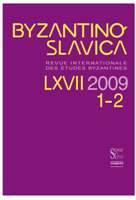The Slavic Theory of the Byzantine Rural Community in Soviet and Post-Soviet Historiography
The Slavic Theory of the Byzantine Rural Community in Soviet and Post-Soviet Historiography
Author(s): Danuta GóreckiSubject(s): Language studies
Published by: AV ČR - Akademie věd České republiky - Slovanský ústav and Euroslavica
Summary/Abstract: This article presents excerpts from the works of Russian historiography, in English translation by the author. It covers the time from around 1850, when Zachariä published his thesis on the Slavic origins of the Byzantine rural community, through the Stalinist period, until the recent developments after the dissolution of the Soviet Union. The discussion concentrates on the roots of the rural community, its organization, its fiscal liability, and its relation to feudalism. The article also sheds light on the personalities of the authors, some of whom were courageous enough to enrich their articles with their own thoughts, judgments, and analyses. Since the tsarist regime until today, those who had, in contrast, been opportunists and conformists began to revisit their own political and ethical attitudes toward the creation of history only in the recent times. However, while changing their views in some points, they retained their procommunist preferences in other respects. This diversity of the authors’ viewpoints has resulted in a variety of new questions, and in conflicting judgments and interpretations. The exception here is one point of the history of the Byzantine agrarian community: despite their disagreements, all scholars agree that it was the closeness, solidarity, and mutual help of the members of that community which guarded it against the destructive aggression of feudal landlords.
Journal: Byzantinoslavica - Revue internationale des Etudes Byzantines
- Issue Year: LXVII/2009
- Issue No: 1-2
- Page Range: 337-364
- Page Count: 28
- Language: English
- Content File-PDF

